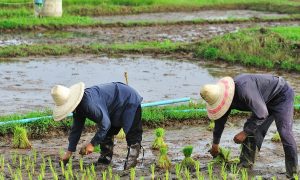Malaysia refines market strategy to expand palm oil reach

Malaysia is enhancing its palm oil market strategy to deepen regional trade ties and promote value-added products. Minister Johari Abdul Ghani noted rising demand in North Africa, Sub-Saharan Africa, and ASEAN. In 2024, 40% of exports went to these regions, with significant growth in North African and Sub-Saharan markets.
KUALA LUMPUR: Malaysia is refining its market strategy to support the growth of specific sectors and deepen commercial relationships, said the Plantation and Commodities Ministry.
Its minister Datuk Seri Johari Abdul Ghani said the aim is to sustain long-term relevance in diverse regional markets in response to changing demands.
Speaking at the Palm Oil Briefing and Industry Dialogue Session, Johari said each region has distinct factors driving palm oil demand.
He said that in North Africa, for example, Egypt plays a key role as a strategic re-export hub, distributing palm oil to surrounding markets.
“In Sub-Saharan Africa, we are experiencing rising demand for industrial applications, particularly in food processing.
“In Asean, rapid growth in the refining and food manufacturing sectors continues to drive the need for high-quality, reliable palm oil supply,” he said in his opening remarks.
Johari noted that the rising demand for value-added palm oil products such as specialty fats, oleochemicals, and food ingredients presents significant opportunities for Malaysia to strengthen its presence in key markets.
“By supporting the development of the downstream sector, Malaysia aims to embed its palm oil more firmly into local and regional value chains, adding economic value beyond raw material supply.
“This approach not only strengthens supply chain integration, but also encourages joint ventures, technology transfer and local processing partnerships, fostering long-term resilient and shared industrial growth,” he said.
Johari said that as Malaysia works to strengthen its palm oil trade, the country has successfully expanded into new and emerging markets.
“Away from our traditional trading partners, last year, 40 per cent of our palm oil was exported to North Africa, Sub-Saharan Africa and Asean.
“Exports to North Africa rose by 63.5 per cent in 2024, and Sub-Saharan Africa posted a 26 per cent year-on-year increase during the first five months of 2025,” he said.
He noted that as the region increasingly depends on Malaysian palm oil to meet its edible oil requirements, this dialogue serves as part of Malaysia’s effort to strengthen long-term partnerships and ensure sustained collaboration.
Johari said Malaysia has long been one of the world’s leading producers of palm oil, with approximately 5.7 million hectares of land planted with oil palm across Peninsular Malaysia, Sabah, and Sarawak.
“It is an export-oriented sector for the Malaysian economy, with 15.4 million tonnes out of 19.3 million tonnes, or 80 per cent of the palm oil produced, being exported in 2024,” he said.
To Read more about Edible Oil News continue reading Agriinsite.com
Source : Business Times

















